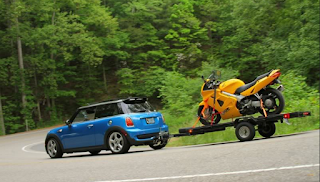Choosing the right trailer tow hitch for your vehicle is not only important for the type of vehicle and trailer you have, but also to ensure the safety of the connection and the drivability of your vehicle. Choosing the right hitch depends on many different factors, including your vehicle’s classification, trailer size and trailer weight.
There are two popular types of towing hitch that are used the most in everyday situations, the basic trailer tow hitch and the air safe hitch, but many other specific towing hitches used for commercial or industrial fields are coming onto the market with special abilities such as the fifth wheel or flatbed hitch.
Basic Functions of a Hitch
In basic terms, a trailer hitch is a strong piece of equipment that attaches directly to a vehicle in order to tow a trailer or a load. The hitch is the device that provides the connection to the trailer from the towing vehicle itself. Considered a permanent installation, there are a few different forms of trailer hitch, depending on manufacturer, but many tend to have the same varied system of standardised mounts.
Classification of Tow Hitch
These trailer tow hitches are placed into the different classification based on a number of factors. One of the most important factors is the weight of the trailer or the load you want to tow. In a complete system, you have to calculate the maximum trailer load weight you can safely tow by checking the towing ratings of your hitch ball, ball mount and hitch itself for the lowest figure.
As the maximum tow rating should be based on the weakest figure of the three, safety is your number one priority. The different hitch classes in place are as follows:
Class 3 Hitch
- Tow up to 2.7 tonne (gross trailer weight)
- Cargo box
- Bike rack
- Motorcycle
- Jet Ski
The Hitch Class 3 Supports Vehicle Classification Such As:
- Sub-Compact
- Car
- SUV/ Van
- Light Ute
- Heavy Duty Ute
Class 4 Hitch
- Tow up to 4.5 tonne
- Small Caravan
- Small Boat
- 2 x Quad bike / Motorbike
The Hitch Class 4 supports all of the previous vehicles, discounting the sub-compact vehicle classification.
Class 5 Hitch
- Tow up to 6.35 tonne
- Medium sized caravan or trailer
- Larger sized boat or fishing boat
- Small farming machinery
The class 5 hitch is usually kept for use with vans and SUVs, light Utes and heavy duty Utes.
Class 6 Hitch
- Tow up 9 tonne
- Large trailer
- Large boat or fishing boat
- Light aircraft
- Light to medium farming machinery
- Some heavy machinery
- Light industrial machinery
Achieve a Smooth Ride
As a hitch is connected to the rear of the vehicle, the more weight that is added, the more your vehicle has to pull. Given the large weight on the rear of the vehicle, this can often hinder ride quality and ride smoothness to a degree that those little bumps in the road can prove quite painful and in some cases dangerous to a heavy load setup.
In these cases, the airsafe hitch is a great innovation in the trailer moving industry and provides a dampening effect to a trailer, to smooth out all of those bumps in the road. The system works by placing the hitch ball or pin system itself onto a bed of compressed air, which is like having an extra layer of suspension between you and your trailer.
Improve Safety of Your Load
This system works so well and is easy to install and attach that many trailer hitch users are now switching to this system. Simply install the air hitch and use compressed air to attain the correct trailer height and you are ready to go. Not only does it improve on ride smoothness, it also improves safety when it comes to maneuvering your vehicle and trailer combo.
When it comes to trailer towing, nothing is more important than safety. Getting your trailer hitch installed correctly by a professional will ensure that you have a solid and secure connection to your trailer. Knowing the weight of your trailer when empty is an important step in keeping you safe and carefully distributing the weight of your loads and securing them safely to the trailer is the final step in your trailer pulling safety checks that will ensure you have a smooth and safe journey.







